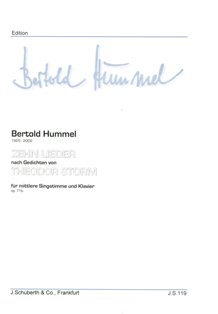
1. Die Stadt
2.
Über die Heide
3.
Meeresstrand
4. Lied des Harfenmädchens
5.
Ständchen
6. Es ist ein Flüstern
7.
Das Mädchen mit den hellen Augen ![]()
8. Die Möwe
und mein Herz
9.
Mondlicht
10. Schließe mir die Augen beide
First performance: May 6, 1987, Dinkelsbühl, Konzertsaal
Martin Hummel / Thomas Hitzlberger
Duration: 25 Minutes
Publisher:
Schott Music ED 20288 / ISMN: M-001-14993-8
| Nr. 1 Die Stadt | Nr. 3 Meeresstrand | Nr. 5 Ständchen | Nr. 10 Schließe mir die Augen |
Coming
from Baden, Hummel has a natural affinity with the directness and reflection in
the language of the Aleman Hermann Hesse. But there are also close relationships
to North Germany, whose astringent poesy as captured by Theoder Storm finds an
musical echo in Hummel. "Hin gen Norden zieht die Möwe, / Hin gen
Norden zieht mein Herz" ("Up to the north strains the seagull, / up
to the north strains my heart") ("Die Möwe und mein Herz"
- "The Seagull and my Heart"). The bareness of nature and landscape
is reduced musically here in most unusual expressiveness to a monotone repetition
of a two-part accompanying motif using no more than 4 notes, above which the voice
rises in clear intervals. The Storm settings are, with the exception of the "Die
Stadt" (1983), all from the years 1976/77 and are not only the simplest
but also the most easily appreciated songs by Hummel. They have something of a
folk-song attitude about them, allowing them - as in earlier times - to use one
musical notation for several stanzas, as for example in the particularly charming
"Das Mädchen mit den hellen Augen" ("The girl with
the bright eyes"), in "Mondlicht" ("Moonlight")
and in the tender "Über die Heide" ("Across the
heath"). This heath song of Hummel's relies entirely on simple melody
and can afford to do without any tonal representations of individual ideas such
as the echoing tread or gathering patches of mist - which one can find represented
even in the simple setting of this text by Brahms (op. 86/4).
Wolfgang
Osthoff (in "Zu den Liedern Bertold Hummels", Tutzing
1998)
Press
Frankfurter Neue Presse 10th July, 1996
Very
interesting, that Hummel was able to compose in 1975 a song-cycle on poems by
Theodor Storm with melodies quasi in the romantic "Volkston" but with
accompaniments which rather recall the early Bartok or can even be traced back
to Impressionism.
Translations:
1. The city
At
the grey shore by the grey sea
and apart, lies the city;
mists push down
hard on the roofs
and through the quiet the sea booms
uniformly about
the city.
No wood murmurs; in May, no bird
chirps without intermission;
only the migrating geese with harsh cries
fly by in the autumn night;
and by the shore the grass ripples.
Yet my heart clings to you,
you
grey city by the sea;
forever and forever the magic of youth
will rest
smilingly upon you; upon you,
you grey city by the sea.
Translation from German to English copyright © by Emily Ezust
2.
Across the Heath
Across
the heath my step resounds;
The dull echo from the earth wanders with me.
Autumn has arrived, Spring is far away -
Was there once, then, a time
of bliss?
Brewing mists surround me like ghosts,
Dark is the vegetation,
and the sky so empty.
Would that I had not come here in May!
Life
and love - how they flew by!
Translation from German to English copyright © by Emily Ezust
6.
There is a whispering in the night
There
is a whispering in the night -
it has kept me entirely from my sleep.
I feel it wants to tell me something,
and cannot find the way to me.
Are they words of love, confided to the wind,
and blown off course on the
way?
Or is it some disaster from future days,
that eagerly hurries here
to announce itself?
Translation from German to English copyright © by Emily Ezust
10.
Close both my eyes
Close
both my eyes
with your dear hands;
So everything that I suffer
goes
to rest under your hand.
And as silently the pain,
wave by wave, goes
to sleep;
as the last blow falls,
you fill my whole heart.
Translation from German to English copyright © by Jakob Kellner
